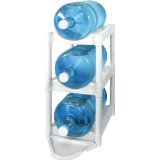I am often asked by those looking to start getting prepared for disaster, “What should I do first?”
Our post today is a re-post from the Prudent and Prepared Blog found at www.prudentandprepared.blog.com. This post along with Building your food stores the right way will give beginners a good start.
It is a natural and necessary question. When someone makes a decision to begin preparing for unforeseen events it can often seem quite daunting. At this point I think it is necessary to take a deep breath and simply start with the 3 basics, food,water and shelter. I always advise that the first item you should secure in your preparations should be water.
It is recommended that the average person drink a gallon of water per day, so if you have a family of 4, imagine needing 4 gallon size milk jugs of water every day for up to 10 days. And that is just for drinking, let alone flushing the toilet, cooking and washing. To be even a little bit comfortable, we can calculate that each person will need at least 2 to 3 gallons a day. That starts to add up.
So where do you start? I suggest you first calculate how much water you will need. For my family of 4, I have calculated 3 gallons each per day and I have decided that I will have enough for 10 days. I need to have at least 120 gallons for potable water stored. To that end I have four 55 gallon, food safe plastic barrels always filled in my back yard. The water in these barrels has been treated with unscented bleach to keep the water clean of bacteria and I empty, clean and refill these every 6 months. As an added precaution, I have a plan to fill each of my 2 bathtubs and numerous 1 to 5 gallon containers that I have on hand with fresh water from the tap, before the taps run dry. If this last provision is the first and only thing you do to secure water, I recommend doing so within the first 4 to 6 hours after the disaster hits (of course, the sooner the better).
Water taken from our lake or creeks will need to be filtered, treated or boiled and if you hope to get your water from these sources, you will need to have a plan and supplies in place.
If you decide to filter your water, there are numerous filters on the market that will fit the bill and you will need to determine which of these works with your needs and budget. Be sure any filtration system you get filters down to .02 microns. This will remove up to 99.999% bacteria and most viruses and chemicals. Filters will only be effective for a certain amount of gallons, so be sure to have replacement filters on hand.
You can also use chlorinated unscented bleach or boiling to make the water safe for drinking. If you are using bleach, be sure it is unscented, put into an uncontaminated container and add 8 drops per gallon of water. Mix well and wait for 30 minutes. The water should have a slight bleach odor. If it does not, repeat the process.
Boiling requires a source of heat. Without power, your electric stove will not help, and your BBQ grill will need propane. I keep 4 extra propane tanks on hand at all times, not only for water purification but also for cooking. Both treating with bleach and boiling will kill off the nasty little bugs, but it does nothing for chemical contamination and floating particulates in the water. I keep a supply of coffee filters on hand should I need to filter what I can of these out of treated or boiled water (clothing and fine thread towels work well too).
Now that you have taken steps for potable water for whatever time span you feel is prudent, you can move on to what I consider to be the next important item on our list of basics, food. I will address this in my next post, until then, begin to assess your current situation. What are your assets that you want to use toward your preparing? When will you be satisfied with you level of preparations (ex. Enough food, water and supplies for a family of 4 for 10 days)? Are you comfortable with preparations beyond the 3 basics (medical, defense, learning new skills, transportation, homesteading, etc.)?
When disaster strikes, don’t panic…..you are prepared.
For additional
information see the following links:
Beginners:
The Rule of 3 (set priorities by this)
Why we are ALL Preppers (for skeptics)
Getting Started (Water)

No comments:
Post a Comment
Note: Only a member of this blog may post a comment.